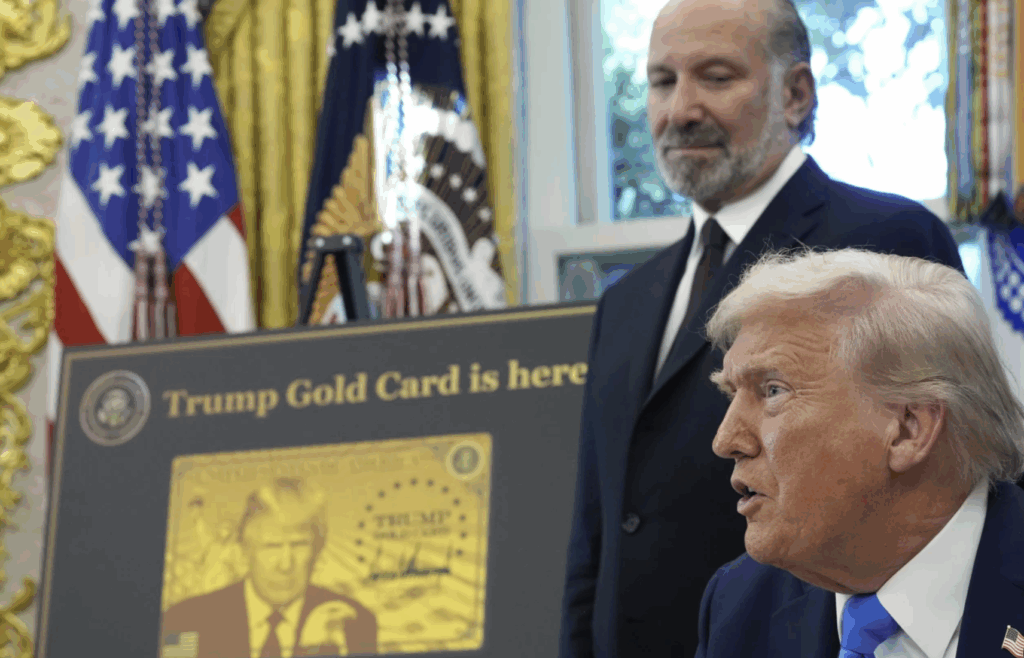 President Donald Trump speaks as Commerce Secretary Howard Lutnick listens in the Oval Office of the White House, Friday, Sept. 19, 2025, in Washington. Photo courtesy of Alex Brandon/AP Photo.
President Donald Trump speaks as Commerce Secretary Howard Lutnick listens in the Oval Office of the White House, Friday, Sept. 19, 2025, in Washington. Photo courtesy of Alex Brandon/AP Photo.
By Allegra West
Boston University News Service
President Trump announced a proclamation to revise the H-1B non-immigrant visa program on Sept. 19, 2025, stating that it has been widely “abused” by employers. The H-1B visa program was initially established by the Immigration Act of 1990, signed into law by former President George H. W. Bush.
Under the original act, immigrant categories were divided into three groups: family-based immigrants, employment-based immigrants, and diversity immigrants. This structure allowed people to immigrate to the U.S. (S.358 — 101st Congress).
Employment-based immigrants, listed under Title 1: Immigrants, Subtitle B: Preference System, Part 2: Employment-Based Immigrants, are primarily skilled workers with “extraordinary ability” in research or academic roles and are limited to a maximum stay of six years. The H-1B Specialty Occupations visa serves as a step toward obtaining an Employment-Based green card or offers a faster pathway for individuals to enter the U.S.
Since 1990, amendments have been made, including the American Competitiveness and Workforce Improvement Act of 1998 (ACWIA), which temporarily increased the number of visas issued annually, and the American Competitiveness in the 21st Century Act of 2000, which extended the visa cap again.
Recent changes to the H-1B visa program, including a new payment requirement, could lead to a decline in research activity and a reduction in healthcare providers and access to medical treatment. According to a 2024 report by the American Medical Association, the U.S. already faces a significant physician shortage, leaving millions without proper healthcare access.
Immigration attorney Giselle M. Rodriguez said many people are already on high alert about these changes and are preparing backup options.
“While the full implementation of the new rules is still pending, we’ve already seen a shift in behavior from both employers and foreign nationals,” said Attorney Rodriguez. “There’s increased caution, especially among companies that rely heavily on H-1B talent. Some are delaying sponsorship decisions until there’s more clarity on costs and eligibility. There is really a sense of urgency and uncertainty. Many are actively exploring backup options or alternative visa categories.”
In President Trump’s new revision of the H-1B policy, all individuals petitioning for a non-immigrant visa program will be required to pay or be endorsed with a payment of $100,000 for entry into the United States. This proclamation came into effect on Sept. 21, 2025, and will remain in effect for 12 months after this date.
Attorney Rodriguez warns that the H-1B policy has broader implications for healthcare and the overall economy of the United States.
“The proposed changes could impact how U.S. employers approach hiring international talent,” said Attorney Rodriguez. “There’s a large pool of highly qualified people from around the world, especially in areas like engineering, healthcare, finance, and research, who contribute meaningfully to the U.S. workforce. In the long run, employers may need to be more selective and intentional about who they sponsor, which could limit opportunities for some while opening doors for others.”
Boston University is one of the few universities that welcomes a diverse group of international students from around the world. According to the U.S. News & World Report, 21% of Boston University’s student body are international students.
For any future Boston University international graduates or any other international individuals, Attorney Rodriguez advises planning and taking advantage of programs and organizations that will allow individuals to stay in the U.S.
“Be proactive and strategic. Start planning as early as possible, ideally before graduation. Take full advantage of programs like OPT [Optional Practice Training] and STEM OPT extensions, and consider employment with cap-exempt institutions such as universities or research organizations,” said Attorney Rodirguez. “It’s also important to build a strong resume in your field and target employers with a history of successful H-1B sponsorship. There are resources you could find online to help with this. Keeping open communication with your school’s international office and consulting with an immigration attorney can also help keep you updated with all these changes.”
Since the revision, the U.S. Citizenship and Immigration Services (USCIS) has clarified on its website that this change will only affect new applicants after the Sept. 21, 2025, proclamation. Looking forward, we may expect to see significant pushback against the Trump administration and this immigration policy.